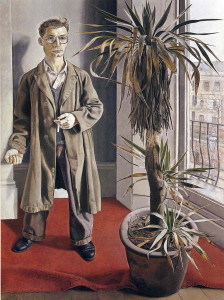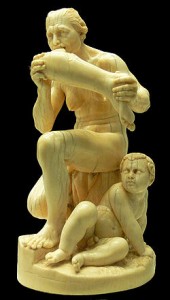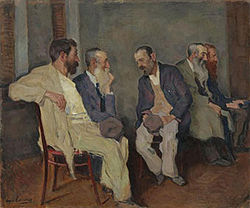Introduction
Since the Paleolithic era, each stage of human evolution has been conditioned by the dominance of a different type of institution, which has determined the way people perceive their relationships and the society they can establish. Understanding the type of institutions that have shaped our society, makes easier to understand the reasons of our problems and the way we are.
In the upcoming lines we will try to expose, in a nonacademic way, the link between institutions and individuals. Through this connection we expect to achieve a better understanding about the causes of the current crisis, which we do not consider it to be an isolated thing, but part of a more global and systemic crisis which began towards the end of the nineteen-century, as we will try to expose on the following lines.
But before we start talking about persons and its societies, is important for us to state what we mean by Person and its difference with a Human being. Being Human means to belong to one specie, the scientific name of which is «Homo Sapiens»; part of the «Hominidae» family. Being a Person is a peculiarity of human beings that transcends its own biological or physical definition because it’s a feature that does not finish in the outer part of the human skin.
One last remark. This article exposes the reasons and causes of the current crisis, but it does not provided any solution, neither offers a proposal for future policies against the crisis. We will discuss these aspects in a separate paper.
0 – The Person
A person is the expression of an Inner Culture, an Outer Culture and the net of social relations in which the person is involved.
This sentence means that everybody has a consciousness of himself, which is the result of the society in which that person was born and it’s composed of everything that this person has learned plus all that has been forgotten. This knowledge from the past, that has shaped the way the person looks at the present, is what we call Inner Culture.
At the same time, we all live in a society made up of lots of different cultural universes, which we interact in our daily lives and that we use as a framework for planning the future. This knowledge and knowhow of the present moment is what helps a person to plan ahead the near and far away future. That’s what we call Outer Culture.
Besides, we cannot consider “Person” someone who has never been affected by the presence of other people; like his relatives, his children, colleagues, enemies, friends, parents, couples, etc. Every relationship that we establish with another person also defines part of what we are. A person immune to relations with other human beings, someone who feels nothing, may be human, but it cannot be considered a person. So feelings and bonds with other beings are part of what defines us as Person.
So, the way somebody acts and behaves depends a lot on his past, his expectations and his social network. We will return to these points later on.
1- The Group
We are social beings because of our biology. This biological feature impels us to be in touch with other humans. The way we establish contact with other humans is transmitting and receiving information to and from other humans. That is to say; setting up a communication.
The communication established with other human beings it’s what turns humans into persons, because throughout this act people may realize that there is something inside them and inside some beings, which transcends their physical appearance. Being conscious of its own self allows people to identify other selves, to compare and to feel that «something» -that has no physical appearance- exists and that «something» may modify the other person behavior. Which matters a lot when you you are in front of somebody and want to know what it is that the other one is going to do next.
The information that the act of communication between people conveys is made out of two different components: a rational part and an emotional part. When a person really understands these two parts, this person has the minimum information to decide whether to trust or run away from the other person. In a wild and primitive world that was very important. Nobody wants to be somebody else lunch but to be able to rely on another one had a great advantage; you may survive longer. When there is confidence between two persons they can protect themselves in a better way, work together, sleep protected and adopt altruistic behaviors. Is part of human nature the need to seek this whole knowledge (rational plus emotional) because people sense that staying together they will have more chances to survive. To live alone is very hard.
When knowledge allows people to trust each other, they begin to join and work together. Nothing inside a group can function without the previous trustfulness that arises from the knowledge of each other. Get ride of knowledge between people and confidence will vanish. Doesn’t matter if it’s a modern or primitive society, without trust people will become suspicious and distrust everything, and society will have to resort to force or other means of pressure to avoid the group disintegration. So, is trust what creates society, not all the other way around. And trust is triggered by emotions.
2 – The Institution and the Group
Every social group must satisfy certain basic needs because people have to eat, play, rest, heal, love, etc. When there is more then one person, the satisfaction of most of those needs is achieved either through self-organization or creating an organized system.
Self-organization requires an in-depth knowledge about the other people in the group. The requirement for an organized system is abstract-thought capability because is necessary to create out of the blue an organized system, a set of rules that before only existed in peoples mind; i.e. an institution. An institution is a rule, use, law or tradition that people agree upon or accept. Once an institution is created it will deal and intermediate between people. Examples of institutions are taxation system, marriage, the language, traditions, monarchy, the constitutions, markets, laws, etc.
Each institution is responsible for a task or action inside group’s life, and those affected by this task must delegate the knowledge to handle the task to the institution. Since any institution intermediates between individuals -because it takes care of some of their relations-, the institutions partly determines the behavior within the group and the knowledge people can access.
3- Knowledge inside the Group
Interpersonal relationships play a key role in the overall development of an individual within a group. Through these relations the individual gets an important social feedback that reinforces his/her adaptation in the group. While interacting and communicating with people, the person obtains knowledge about the other persons and about himself, and thanks to this knowledge the person can fine-tune its behavior inside the group and be conscious of the links he is establishing with people.
When an institution intermediates between people, it acts like a black-box that gets some inputs from persons, process the information, and outputs some guidelines for the people to follow. So, in the natural process of interacting and communicating that people establish to know each other, now there is a filter that blurs the emotional knowledge that people may acquire and process the rational knowledge of each person involved in the social link. Because of the presence of an institution in between people, there is a change in the feedback that a person will receive from the others. People do not get any more transparent information in the rational or the emotional channels. Between you and me now there is an institution. Thus it becomes more difficult for the people linked by relationships to obtain a good understanding of each other.
For example, lets suppose that every morning you have to take care of your family and wake them up. When you do this every morning, you learn their reactions and the way you have to act in order to wake up each person. You know if somebody needs a bit more sleep, if somebody is already awake, if somebody had a stormy night or somebody sleeps like an angel. You may found as well, how it changes your mood when somebody is really grumpy, or another one looks like is glued to the bed-sheets or when somebody wakes up with a smile and gives you a kiss. Interacting with people gives you knowledge about people and about yourself. And you can use this knowledge to create bonds and shape up your relations and the way you are.
Now we will set up the following institution:
“everybody has to wake up at seven o’clock in the morning” and we will give alarm clocks to the people for them to wake up sharp on time.
Now you have an institution, you don’t have to wake up early, neither you have to go through all the family waking them up. You got more spare time to invest in other things or in doing nothing, that’s wonderful! But you lose all that knowledge about the others and about yourself that every morning you acquired. Now, when you meet somebody in the morning and the other one maybe is in a bad mood, you do not know why. You don’t share this part of that person’s life any more.
So, you have more spare time but you are a bit more lonely and isolated inside the group. No big deal when there is only a simple institution in between people but the more institutions that people creates and the more complex they are, the more layers will be between two persons connected by a need.
Same happens in a bigger group like modern society. Institutionalizing an aspect of life release people from some social tasks but it makes more difficult for people to understand how and why the other people act in a peculiar way, and the bonds of trust suffer a lot for this lack of knowledge. At the same time, the institution becomes a key element in society because it gives people the opportunity to do more things; they have more spare time so they may improve the quality of life. Beside, when an institution is part of a group, it helps to define the group. I.e. because of an institution such as a king, a constitution, a tradition, a language, a currency, a law, a religion etc. people may be tagged as belonging to a particular group.





